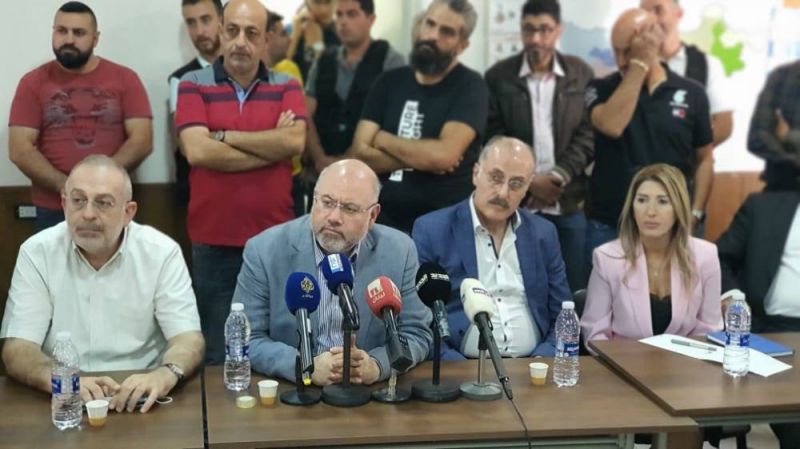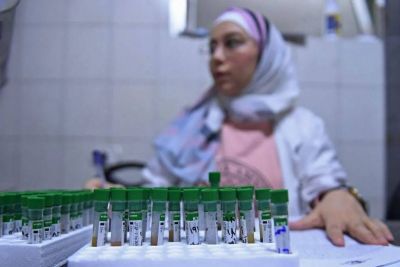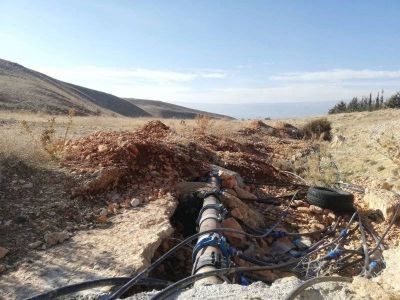
Health Minister Firass Abiad gives a press conference during a visit to North Lebanon on Oct. 9, 2022. (Credit: Michel Hallak)
Caretaker Lebanese Health Minister Firass Abiad deplored on Sunday a "setback in basic services" during a tour in North Lebanon, our correspondent in the region reported. The minister's tour comes after two cholera cases were recorded in the Akkar region. Abiad also denounced "pretexts" put forward by the international community to explain a decline in aid to Lebanon despite the issue of Syrian refugees on Lebanese soil.
On Thursday, Lebanon recorded its first case of cholera since 1993. Another case followed on Friday. "These cases are probably due to a serious epidemic in Syria, and were brought by travelers who crossed the porous border between the two countries," the minister said.
"We have seen a decline in basic services, whether for the Lebanese people or the refugees," the minister said at the end of his tour, which included not only a water treatment plant but also a refugee camp and hospitals in the area.
"This setback is reaching a level that exposes Lebanon to epidemics that it has not seen for a very long time," he continued, expressing fears of the impact of such outbreaks on public health.
"There is also a decline in aid from our international partners under many pretexts," Abiad said. "Of course, we do not accept these excuses, because we believe that the resolution of the issue of the refugees that has lasted for 11 years is not the sole responsibility of Lebanon, but also and primarily of the international community," he went on, referring to the civil war in Syria that began in 2011.
Electricity for water infrastructure
Earlier in the day, Abiad inspected the water treatment plant in Tripoli. During his visit, he stressed the importance of securing a consistent power supply for the plant so that it can provide residents with water, "otherwise, citizens will have to search for other unsecured sources," the state-run National News Agency reported.
Tripoli's Water Authority's plant "has the ability to secure safe drinking water for Tripoli and the northern regions," but that doing so is contingent on the plant receiving electricity, he stressed.
Abiad added that "we should not forget that Tripoli has previously suffered from a hepatitis A outbreak, so we will focus on the continuity of the work of the Water Authority, and we stress on [the need for] the Ministry of Energy and Water to secure electricity for the continuity of work and pumping water" to Tripoli and the northern regions.
Abiad also appealed to those who support the Health Ministry, such as UNICEF and other United Nations organizations, to provide "more support, especially in this situation [the resurgence of cholera]," adding that "in the absence of safe and clean water, the spread of the epidemic will be rapid."
The minister also urged citizens who have water wells to “cooperate with the authorities or municipalities to have their water examined in laboratories, and ensure that it is free of germs,” referring to an initiative by the ministry that will be announced later to help citizens ensure their water is disease-free.
In a televised interview, the head of the Order of Physicians in Beirut, Joseph Bakhache, said Sunday that "the number of cases of cholera has not exceeded two or three in Lebanon.
He said he was keen to "reassure people, even if we should not neglect this subject."
"It is necessary to isolate the contaminated people to break the chain of contagion, and the Ministry of Health has begun to analyze the water to know the origin of the spread," he added.
Bakhache recalled that about 30 percent of doctors have left Lebanon since the onset of the financial crisis in 2019. The Lebanese health care system has been hit hard by the three-year crisis as well as by the August 2020 Beirut port blast that destroyed critical medical infrastructure in the capital.

